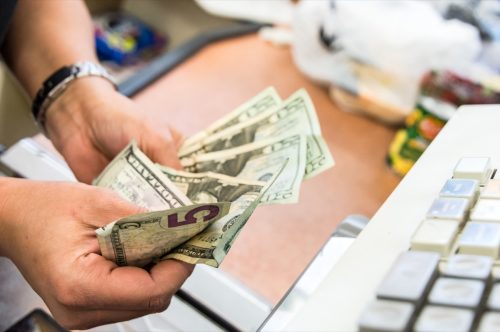Retailers Are Using These Tricks to Get Your Money and Data, FTC Says in New Warning

We’ve all strayed from our shopping list at one point or another—whether that was grabbing more than you meant to off the shelves at Target, or adding additional items to your Amazon cart. But don’t blame yourself for getting enticed by extra products. After all, a store’s main goal is to increase its profits, so they’re pulling out all the stops to try to get shoppers to spend more. According to the Federal Trade Commission (FTC), however, some of these retailer tricks are not necessary legal. Read on to find out what the agency is cracking down on now.
READ THIS NEXT: These Are the Products You “Need to Stop Buying” at Dollar Tree, Shopper Says.
Americans are making more impulse purchases right now.

If you’ve found yourself spending more than you mean to these days, you’re not alone. Slickdeals, a company dedicated to helping shoppers save, released new findings in May 2022 detailing how impulse spending is rising in the U.S. According to the survey of 2,000 American shoppers, 64 percent of adults said that their impulse spending increased this year. The company said the average person has spent $314 per month on impulse purchases in 2022, which is up 14 percent from $276 in 2021 and $183 in 2020.
“While inflation is certainly impacting budgets across many essential shopping categories, interestingly, we’re also seeing consumers reporting an increase in the frequency of their impulse spending,” Louie Patterson, the personal finance content manager for Slickdeals, said in a statement.
The FTC says this could be the result of a rise in certain retailer tricks.

This increase in impulse spending might not just be on you. On Sept. 15, the FTC released a new report indicating that there has been a rise in dark patterns being used by retailers to trick shoppers. According to the organization, dark patterns is a term that was coined by user design specialist Harry Brignull in 2010 to describe “sophisticated design practices” that companies use to manipulate consumers in more ways than one. As a result, they end up making choices they would not otherwise have made and that may cause harm,” the FTC explained.
“Our report shows how more and more companies are using digital dark patterns to trick people into buying products and giving away their personal information,” Samuel Levine, Director of the FTC’s Bureau of Consumer Protection, said in a statement.
The agency added, “As more commerce has moved online, dark patterns have grown in scale and sophistication, allowing companies to develop complex analytical techniques, collect more personal data, and experiment with dark patterns to exploit the most effective ones.”
RELATED: For more up-to-date information, sign up for our daily newsletter.
There are four common types of dark pattern tactics being used.

According to the FTC, there are many several types of dark patterns being used by various companies. “For years, unscrupulous direct-mail and brick-and-mortar retailers have used design tricks and psychological tactics such as pre-checked boxes, hard-to-find-and read disclosures, and confusing cancellation policies, to get consumers to give up their money or data,” the organization said.
But the FTC’s new report, “Bringing Dark Patterns to Light,” focused in on four dark pattern tactics that are commonly being used by companies these days: “Misleading consumers and disguising ads; making it difficult to cancel subscriptions or charges; burying key terms and junk fees; and tricking consumers into sharing data.”
Examples of these tactics include ads designed as independent editorial content, fake countdown timers, recurring payments for unintended products or services, advertising only part of a product’s total price up front, and steering consumers toward privacy settings that give away the most personal information.
The FTC is fighting back against these retailer tricks.

Thankfully, the FTC is fighting back. “As the nation’s leading consumer protection agency, the FTC mission is to stop deceptive or unfair business practices in the marketplace, including those that take the form of dark pattern,” the agency explained in its report. In fact, the FTC has already been working to combat this issue through a recent enforcement policy statement warning companies against deploying illegal practices to trick or trap consumers and a number of legal cases.
According to its report, the agency has levied lawsuits against several companies for using dark patterns, including ABCmouse, LendingClub, and Vizio. Some of its cases have covered tricks like “requiring users to navigate a maze of screens in order to cancel recurring subscriptions, using non-descript dropdown arrows or small icons to hide the full cost and other terms of rent-to-own or other payment products, and even sneaking unwanted products into consumers’ online shopping carts without their knowledge,” the FTC said.
“This report—and our cases—send a clear message that these traps will not be tolerated,” Levine said.